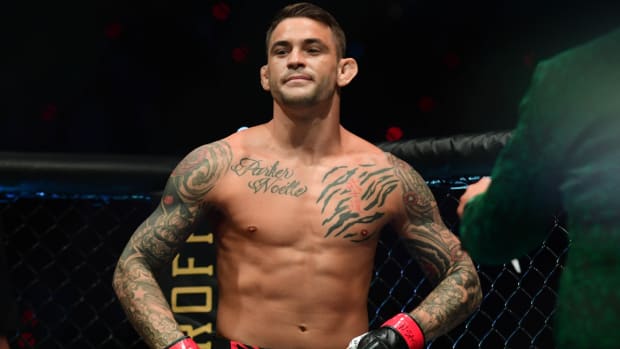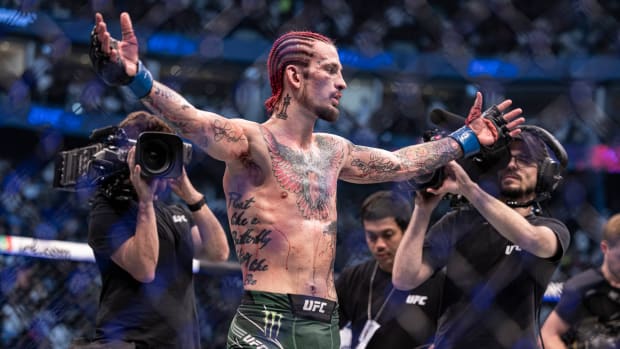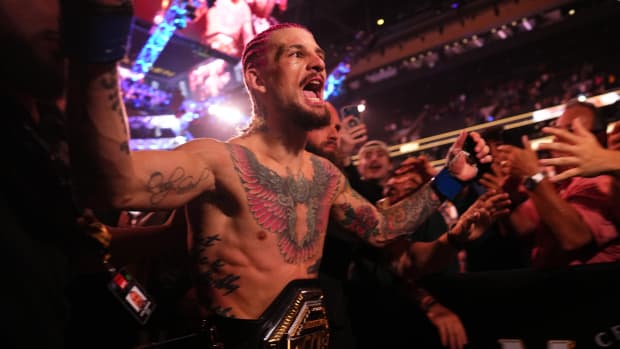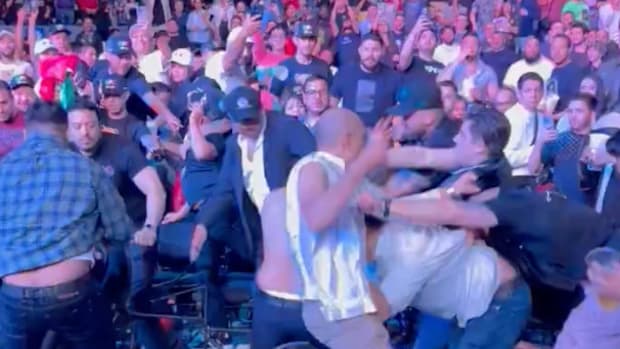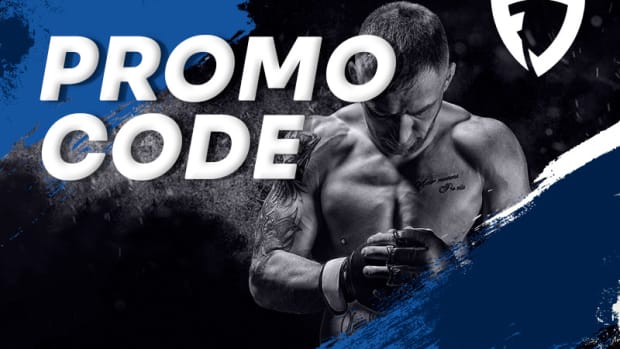There's More to Derrick Lewis Than Punishing Punches and One-Liners
Start a free seven-day trial of SI TV today to see watch the full feature on heavyweight fighter Derrick Lewis, along with other in-depth interviews and features on the biggest names in sports.
HOUSTON – The most accurate method for measuring the titanic punching power of Derrick Lewis, perhaps the unlikeliest heavyweight title contender in UFC history, is not to see how those jaw-dropping (and jaw-cracking) blows leave opponents stupefied, but to hear how they sound. “Like a shotgun,” says fight coach Bob Perez, shaking his head while patching together two 22-ounce focus mitts with duct tape for the umpteenth time. “He busts every single pair.”
It’s a Friday afternoon at Main Street Boxing & Muay Thai, a rugged downtown gym nestled next to a bail bonds service and a tax store, less than three blocks from the Houston Rockets arena. Out front, window signs invite passersby to LOSE WEIGHT! and GET RIPPED!
Only one car is parked along the curb: a towering black pickup truck, raised on a suspension lift, emblazoned with a howling gorilla on the driver’s side door—an homage to its owner, nicknamed Black Beast. Before he fought for a living, Lewis towed cars for AAA. Now he owns two Mercedes, one BMW, one Camaro and the dually 3500 pickup, plus a Lambo that he says will be shipped soon.
Upstairs, as lunchtime clients hit heavy bags and unleash percussive grunts, Lewis strolls across the mat, barefoot and sipping a cotton candy-flavored energy drink. Setting down a UFC backpack, he sprawls out to get stretched—legs jiggled, hips twisted, muscles kneaded—before Perez ties on his sparring gloves, sized Triple-XL. Two weeks earlier, those boulders delivered a buzzer-beating, come-from-behind knockout of Alexander Volkov at UFC 229 in Las Vegas, rescuing Lewis from a surefire decision defeat. This was memorably followed by a knockout octagon interview that upped his Instagram follower count by 1 million-plus and inspired limited-edition T-shirts based on his most viral quip: “My balls was hot.”
Less than three days later, Lewis had agreed to face Daniel Cormier at Madison Square Garden on Nov. 3 for the heavyweight belt—despite still nursing a broken finger sustained against Volkov. It was a remarkably short turnaround for someone who claims that his daily workouts only last 30 minutes. Of course, much like the balls line—Lewis had chucked his shorts into the crowd as a fan giveaway, not because his privates were piping—this is bogus. “90% of things he says on camera is b------, for shock value,” says Perez.
Short and sturdy, a monocle away from the Monopoly Man thanks to his twisted handlebar mustache, Perez has been training Lewis since the latter’s UFC debut, a first-round knockout of Jack May in April ‘14 with—what else?—punches. When Perez holds pads for other fighters, he keeps the sequences simple: cross-hook-cross. Listed at 6’3”, Lewis stands out not for his diversity of strikes, but how furiously he repeats those same moves in succession. “He gets in a firefight and he’ll go right-left-right-left-right-left,” Perez says. “At first, I did try to change him. I tried to make him a technical guy. But that would’ve ruined him. That’s not Derrick.”
Who is Derrick Lewis? Someone whose punches indeed sound like gunshots, for starters. CRACK! THWOCK! And definitely not someone who only trains half an hour either. Today his workout will last triple that amount of time, most of which is spent wrestling two area partners brought aboard for their physical resemblance to the 5’11” Cormier. But Lewis happily lets folks think he lacks enough stamina for three rounds, let alone a five-round title bout against an impeccably conditioned legend who current claims both the heavyweight and light heavyweight crowns.
It is not unlike how he behaves in the octagon, lazing around the canvas, posture slouched, probing for a window … before pouncing, cross-hook-cross. Perez compares this attack mentality to an alligator. “Either that or a panda,” Lewis will say later. “Pandas, they vicious, man. You think they so cute, then they scratch the hell out of you.”
Caked in sweat when the workout ends, Lewis slugs some water while fanning his bare belly with a towel. Soon he will decamp downstairs to film a lengthy interview, before which Perez offers some sage advice that doubles for any opponent who dares enter the cage alongside him: “It’s Derrick, dude, remember that. He likes to f--- with people.”
Sure enough, when a softball starter is lobbed his way—Whatwas the focus of today’s training session?—the self-proclaimed Black Beast transforms into a demon of deadpan:
“Really what you see today was photoshopped,” he says. “That really wasn’t me. I appreciate Shaquille O’Neal for stepping in as a stunt double.”
In fact, Lewis does keep some canned phrases handy. Here is one that he employs all the time, describing his home-run fighting style: “I’m really not a mixed martial artist. I’m a brawler.”
The difference, he says, lies with technique. Mixed martial artists are just that—proficient in multiple methods like Muay Thai or jiu jitsu. Cormier earned all-American status at Oklahoma State and finished fourth in freestyle wrestling at the 2004 Athens Olympics. Lewis, on the other hand, possesses no such background. Nor does he seem especially interested in learning. “I believe I’m unique,” he says. “I believe a brawler is someone who puts their head down, tucks their chin, bites their mouthpiece and swings for the fences.” And then, without prompting, “I believe I developed that style because I have a lot of anger built up [from] my childhood.”
Perez talks about the “dark place” that Lewis goes before fights. It’s why Perez always rises extra-early that morning and leaves their hotel room, so Lewis can be alone with his thoughts. “You’ve got to really have a special type of personality to go in there and try to hurt someone that didn’t do anything to you,” Lewis explains. And so he revisits his childhood in New Orleans, where his first punch was thrown to protect his mother from his stepdad. He remembers the three and a half years that he spent in Texas prison for violating probation on an aggravated assault charge, and the college football scholarship that disappeared as a result.
“I think about my past,” he says. “I let all that stuff right there play over and over in my head. I believe everything happens for a reason. If I didn’t go through the stuff I went through when I was younger, I probably wouldn’t be here today, be so successful.”
Not long after his release in 2009, Lewis went to dinner with Carl Carrillo, a former football teammate at Cypress Springs High School. Recalling how Lewis would bull past offensive linemen and de-cleat quarterbacks from his edge rusher spot in their 3-3 stack scheme, Carrillo offered an inspired suggestion. “Dude, you might want to try this MMA thing,” he said, “because it’s getting pretty big.”
At first Lewis balked, content to lay low in his new gig with AAA. “He didn’t believe you could fight people for money and not get in trouble,” Carrillo says. “It was all new to us too.” But Carrillo persisted. One night, he asked Lewis to punch an old 100-pound Everlast bag that had been stashed in his garage; Lewis struck with such force that Carillo and several other friends took turns holding the stand in place so it wouldn’t topple over.
Soon after Carrillo convinced Lewis to check out a small MMA gym in Houston called Silverback. That’s where he embraced his current nickname, developing the signature chest-beating, gorilla-imitating celebration that he unleashes after each knockout. Turning heads on the local scene, Lewis caught the attention of a legend. At first, George Foreman only sought Lewis out as a sparring partner for his son, Monk. Then Big George saw Lewis punch.
“Everything was going good,” Lewis says. “He was trying to get me an apartment in downtown Houston. Gave me a car. I told him we’ll see how everything goes with my first MMA fight. So they really was like, ‘No, we think you should stick to boxing.’ They flew me to Vegas, started training at one of Mayweather’s gyms … Then I came back to Houston and a week later had my first pro fight. That went well, knocked the guy out in the second round. I was like, nah I’ll stick with MMA. They took everything away. Took the car, took the apartment.”
No matter. At a recent UFC 230 press conference, Lewis estimated that he banked $1 million from the Volkov fight. He also said that, win or lose, he will take home more against Cormier than his preview three bouts combined. Cormier’s coach, Javier Mendez, describes the 39-year-old as “a history buff of fighting and sports,” always aware of where his legacy resides in the octagonal pantheon. Lewis falls on the other end of the spectrum. Asked why he fights, Lewis replies fast: “Oh, the money. That’s the only reason why I’m in mixed martial arts … I don’t care about being the best fighter in the world, or being champion, or trying to set a legacy. I don’t care about none of that. To me, it’s just a job. That’s how I look at it.”
According to manager Lou DiBono, this attitude makes Lewis “an old-school guy” in the combat sports world, more concerned with putting food on the table than trophies in a case. Perez compares his star client to Russell Crowe’s character from Cinderella Man (2005), the based-on-a-true-story film about a Depression-era longshoreman who returns to the ring and becomes heavyweight champion (at Madison Square Garden, no less). Citing his wife April and their three children, Lewis agrees. “That’s why I put so much stress on myself,” he says. “Just have a better future for my kids, to make sure they’re set up after I’m dead and gone.”
Of course, there is always room for instant gratification too; after Lewis fights, he always treats the kids—ages 15, 7 and 5, all of them “evil geniuses”—to a toy store trip, but only if they have learned new vocabulary words. “Whenever I was younger, I didn’t have anyone who tried to teach me how to read and do math,” Lewis says. “I want them to be more advanced than I was, when I was their age.” These are ying-yang forces fueling Lewis, love and hate intertwined. It is quite likely that Lewis is responsible for at least one of Perez’s eight career inguinal hernia repairs. But he is also always the first fighter who shows up at the hospital post-operation.
DiBono, meanwhile, thinks about the hug that they shared hours after the Volkov fight, tucked away in the high-rollers lounge at the MGM casino, where Lewis’ camp had retreated for some quiet. They had been discussing the 5 a.m. call that Lewis had placed to DiBono one morning before his scheduled UFC debut, complaining about a headache from colliding against a metal cage post during a workout. And the doctor who informed Lewis that an MRI revealed a blood clot in his brain. And the three weeks that Lewis spent holed up in Miami until the blood thinners worked their magic, the pinnacle of his career on pause.
“Will I ever be able to fight after all of this is done?” Lewis had asked the doctor, but there he was four years later in Las Vegas, a 21st win and the 18th knockout on his resume, not to mention the exponentially increasing number of social media followers infatuated with his … southern hemisphere climate. And so DiBono made a promise.
“Our next fight’s going to be for the belt,” DiBono told Lewis.
“We’ll see,” Lewis said.
Around 12:35 p.m. on Halloween afternoon, Lewis walked onto the hardwood basketball floor at Madison Square Garden, hands stuffed in the pockets of his hoodie, and announced that he was forgoing a scheduled open workout in favor of a fan Q&A. Sipping a Red Bull courtside, Perez explained why. “He gets more nervous doing public workouts than fighting,” the coach explains. “I think he, maybe subconsciously, worries about how people might judge him.”
Clearly this is not the case behind a microphone. The first question comes from an Australian fan who wonders what (and how much) heavyweights like Lewis eat before competition. “Well,” he replies, “if my wife is in town, I eat her ass. If not, pasta, ravioli, stuff like that.” The small crowd, maybe a hundred or so, roars. That is the show they came to see—the beast, unfiltered, jabbering about his giblets: “You asking how hot my balls is?” he tells another curious fan. “They’re pretty good right now. Hopefully it stays that way.”
From his seat, Perez is asked how Lewis is feeling, less than 72 hours from the biggest fight of his life. “Happy,” replies Perez, simply. For good reason, too. Last night they toured Times Square, stopping inside the famous Midtown Comics. (Both Lewis and Perez are self-professed “nerds”; Perez recently bought Lewis a replica of Longclaw, the Valyrian steel sword wielded by Jon Snow on Game of Thrones.) And soon Lewis will unveil a sponsorship with Popeye’s, entirely because he once called out Cormier for “disrespecting” the chain’s fried chicken in a goofy video. It is ridiculous, yes, but also a tasty business score for UFC.
“He’ll say, ‘I don’t want the belt, the belt doesn’t mean anything,’” Perez says. “But with the belt comes all this other really good stuff, and I think he’s finally starting to realize it. Don’t get me wrong. He’ll go to his bad place and try to kill DC, but he seems to be excited about this fight, more than I’ve ever seen him.”
More than 2 million pay-per-view purchases made last month’s Conor McGregor–Khabib Nurmagomedov bout—and subsequent melee—the most watched MMA card ever, according to UFC president Dana White. And while Cormier–Lewis might not sniff those record-setting numbers—or that level of verbal bile, considering that their only beef has been about fried chicken—there are plenty of reasons for combat enthusiasts to care.
Most will agree that Cormier, ranked as the world’s best pound-for-pound fighter, holds the edge in virtually every category except three: height, weight and, as Mendez says, “freakish power.” As such, the expectation is that Cormier will try to fatigue Lewis over five rounds. To combat this, Lewis has devoted extra time to defensive wrestling and cardio during his abbreviated camp. (A typical length is eight weeks; Cormier and Lewis only got two and a half.) Perez reports him drinking more water, cutting back on soda, and eating “pretty healthy by Black Beast standards.” The quick turnaround should also ease Lewis’ cutting process; prior to the Volkov fight, he dropped 13 pounds on the day before weigh-ins.
But Lewis understands that he will not become heavyweight champion on the ground; only one of his 21 MMA victories have been decided via submission. Besides, he loathes ending fights this way. Decisions are even worse. “Kill or be killed,” Perez told Lewis between the second and third rounds against Volkov, when it had become clear that only a TKO could save him.
“To me, knocking a guy out is more satisfying than any submission,” Lewis explained in Houston. “Whenever you’re hitting somebody, seeing their reaction, their eyes, their face … they’re looking that way, they hit them again, they close their eyes, their eyes looking somewhere else, it’s a cool experience. You gotta try it one time.”
Back beneath the bright lights of MSG, the impromptu interview session ends after eight minutes but Lewis hangs around for much longer, snapping photos and signing autographs for fans who clamor toward the court. Looking on, Perez is taken back to the Friday following UFC 229, a few days after the main event with Cormier was booked, when he and Lewis met for dinner in Houston. Once the check had been paid, as they were walking to their cars, Perez stopped Lewis and asked for a private moment of serious talk.
“So,” he said, “what do you think?”
Without hesitation, Lewis shot back, “I’m knocking this m----------- out.”





